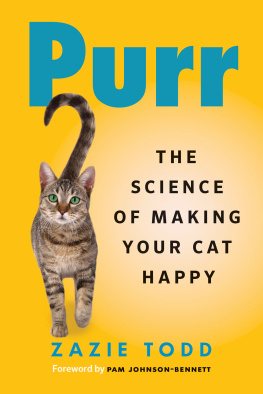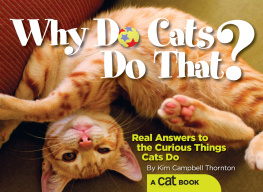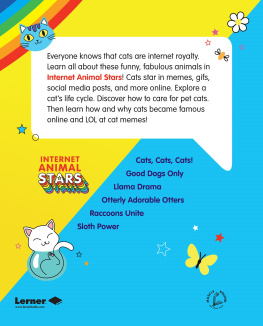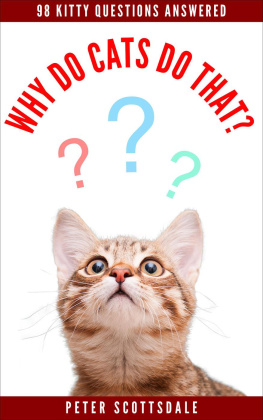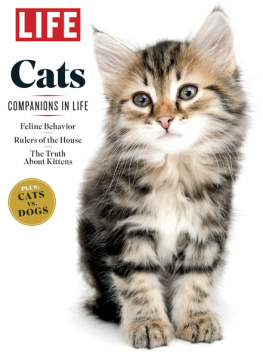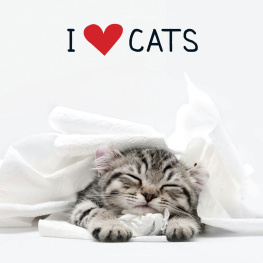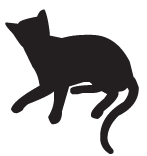Praise for Purr
A wonderful, evidence-based guide with concrete suggestions for cat owners to improve the lives of the cats they live with. Purr is a welcome and exciting addition for every cat lovers bookshelf.
MIKEL DELGADO, PhD, certified applied animal behaviorist and cofounder of Feline Minds
What a gift to applied animal behavior is Zazie Todd. Purr is both packed with the latest findings and eminently readable. I could not recommend it more highly.
JEAN DONALDSON, the Academy for Dog Trainers
Purr is an absolute must-read for all animal lovers! This fantastic, evidence-based guide is bound to influence cat-guardian relationships for the better.
SARAH-ELIZABETH BYOSIERE, director of the Thinking Dog Center and assistant professor at Hunter College (CUNY)
Practical, entertaining, and thorough. Cat owners are in good hands with Zazie Todd.
LUCY JANE SANTOS, author of Half Lives: The Unlikely History of Radium
Cat lovers learn the science behind cats petting preferences; the multiple meanings of purrs, chirrups, and meows; how to best satisfy the scratching and stalking desires for indoor cats; and even how to keep both cats and wildlife safe if your felines spend time outside.
CAT WARREN, New York Times best-selling author of What the Dog Knows
Purr is cat-centered, so much that it feels like a very smart cat wrote it! Starting with the most recent scientific findings, Zazie Todd explains with clarity what cats enjoy, what is good for their well-being, and how we can build a strong reciprocal bond with them. Indispensable reading.
CARLO SIRACUSA, coeditor of Decoding Your Cat and board-certified veterinary behaviorist, UPenn School of Veterinary Medicine
For all the cats, but especially Harley and Melina.
Contents
Foreword
WHEN I BEGAN my career in cat behavior consulting in 1982, it was a lonely field. It seemed that animal professionals were more focused on dog training and health. Over the next four decades, the field has extended to our feline pets, Im glad to say, and Dr. Zazie Todd has played a role in that welcome shift in both attitude and support.
Too many people dismiss cats as independent, untrainable, aloof, and unaffectionate. Through my own writing and whenever I speak or am interviewed, one of my goals is to change that impression. I wrote the book Think Like a Cat to help cat owners see life from a cats point of view. It was a groundbreaking book, because it was one of the first to highlight the importance of a cats emotional health. It wasnt just about training a cat to behave, but also about understanding why cats do what they do and how to strengthen the bond you share. Every behavior serves a purpose, and when you stop labeling actions as misbehaviors, you begin to enjoy how truly smart, affectionate, social, and tolerant cats are.
The cat behavior field continues to grow as more people appreciate the importance of cat happiness, enrichment, stress reduction, and positive training. That said, cat owners often dont know where to turn for accurate, science-based information that they can put into practice in daily life. Many still go by past beliefs about cats or follow advice of friends or what they read on the internet. This is where Dr. Zazie Todds work is making a difference. Her training in psychology and her knowledge of animal training and welfare, paired with a deep love and understanding of how cats think, make her a terrific resource. In Purr: The Science of Making Your Cat Happy, she shares sound, evidence-based research and theory along with years of professional, hands-on experience. She makes the techniques easy for any cat owner to implement by ending each chapter with tips to apply the science at home. Dr. Todd gets to the heart of what cats need and, most importantly, why they need it.
I have been a fan of Dr. Todds Companion Animal Psychology website for quite a while, and learned so much from reading her first book, Wag: The Science of Making Your Dog Happy. She does all the heavy lifting for us by tracking down and dissecting the latest research, and she then interprets and shares it in a way every cat owner can understand. Todds love for cats shines through in her writing. She is also a natural teacher and one of the best spokespersons for our beloved companion animals.
Purr: The Science of Making Your Cat Happy offers valuable insights into that beautiful, graceful, and intelligent creature known as your cat. Dr. Todd takes you on an in-depth yet very accessible tour of what cats need physically, environmentally, and also emotionally. This is where science meets heart.
From kittenhood through your cats golden years, happiness awaits you and your favorite feline within the pages of this marvelous guide.
PAM JOHNSON-BENNETT, CCBC
Introduction
S OFT YET CLAWED, with a beautiful purr yet considered inscrutable, cats are much misunderstood. As with so many things in life, the more you put into your relationship with your cat, the more you will get back. Whether kept indoors or at least partly outdoors, as a single cat or in multi-cat homes, all cats have particular needs. After years of writing about and working with cats, Im thrilled to write about how taking account of cats needs can give you a better human-feline relationship and, along the way, to share the story of my own cats, Harley and Melina.
I earned my PhD in psychology at the University of Nottingham, where I taught small group classes in animal behavior and other introductory psychology topics, even dissecting sheeps brains (in the days before guidance on bovine spongiform encephalopathy meant this practice was inadvisable). I worked as a social psychologist for some years, conducting research on the perception and communication of risk, before emigrating to Canada with my husband and completing an MFA in creative writing at the University of British Columbia. After adopting two dogs and two cats in a short space of time, I was surprised by some of the information I came across, which didnt fit with what I already knew about animal behavior from my background in psychology. In particular, I was concerned about recommendations to use harsh training methods. So I began to do more research on what science tells us about the behavior of companion animalsand found the fascinating fields of canine and feline science.
In 2012, I started my blog, Companion Animal Psychology, to share quality information about cats and dogs with ordinary pet lovers. I found that theres a real need for articles that are evidence based. I was thrilled to win a scholarship to study at the Academy for Dog Trainers, known as the Harvard of dog training, where I learned efficient training methods and how to deal with behavior problems such as fear and aggressionthe practical application of the psychological science I had taught so long ago. I also took an Advanced Certificate in Feline Behaviour from International Cat Care, a wonderful course that covers all aspects of how domestic cats experience the world and behave in it. Along the way, I learned a huge amount from volunteering with cats, dogs, and small animals at my local branch of the British Columbia Society for the Prevention of Cruelty to Animals (BC SPCA), a world-leading organization. I enjoy helping people resolve behavior issues with their dogs and cats through my business, Blue Mountain Animal Behaviour. And Im lucky enough to still be involved in some research on companion animal behavior, and to teach a course on communicating anthrozoology for the masters students in the anthrozoology program at Canisius College (anthrozoology is the study of peoples relationships with animals).

